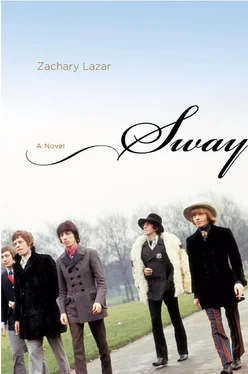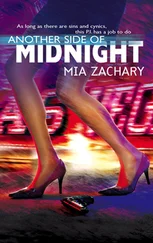He looked at his face in the rearview mirror: his dark hair coming down over his forehead, his blue eyes beneath the hatch marks of his eyebrows. His head felt empty, full of air. The longer Charlie was gone, the less he trusted him. Charlie said that fear was the end of thought, the end of lies, an opening up to what was real and true about someone, his soul. But that had always sounded to Bobby like just more of Charlie’s bullshit, words for the others, not for him.
He got out of the car and crossed the street, flicking the hair out of his eyes. He walked across the gravel yard — the cement circles, the cactuses in their little islands — but everything he saw was slightly blurred, as if he were looking at it through a smeared pane of glass. At the back of the house, he found a wooden door, a flimsy thing with a windowpane and a rusted brass knob. It was still open a crack, as Charlie must have left it. He stood there for a moment, hesitating. He had felt like a child in the car — just wait here for a minute — but now he felt even more like a child, standing outside the door.
Inside, there was a small laundry room, a kitchen beyond it, all of it dark. There was something hanging from the ceiling — three baskets connected by woven strands of yarn that held fruit and boxes of tea. The kitchen counter had all kinds of domestic things on it: a ceramic cat; several canisters for flour, sugar, and the like; a notepad by a telephone. He could see through a rectangular opening into the empty living room with its dim walls. Above the sectional sofa hung a clock shaped like an exploding star.
Charlie emerged from a hallway off to the side. He turned to Bobby with a kind of disgusted shrug, his hands crossed before his waist. Under his arm, pressed to his side, he had what looked like a rolled-up extension cord.
“Not what you thought,” he said.
He turned and walked into the living room, his hair covering his face. In the faint light coming in through the picture window, the furniture looked strangely abandoned.
“What is this?” Bobby said.
“I told you that already. It’s a friend’s house.”
“What friend?”
“Right now it’s just a house. It’s just here. What difference does it make whose house it is?”
He sat down in a padded armchair, putting the extension cord down on the coffee table before him. The sack was on the floor at his feet, hidden from Bobby’s view, and he reached down into it, rattling the paper. He brought out a can of beer and offered it to Bobby with an upturned, cupped hand.
“You knew something like this was going to happen, didn’t you?” he said.
“I don’t know. I don’t know what this is.”
“This is kind of like the experiment where you break into someone’s house in broad daylight and decide whether or not you can handle it.”
Bobby looked back to the kitchen door. It was still partly open, sunlight brightening the little curtain in front of the windowpane, a bleached pattern of inkblots on pink fabric. In the living room, Charlie looked almost like a doll, dwarfed slightly by the overstuffed chair. He was small, only five and half feet tall, and yet the dark room seemed to gather itself around him, as if habituated to his occasional presence.
“You came all this way, you might as well have a seat for a minute,” he said. “Nothing’s going to happen to you here. Just trust me for a minute.”
Bobby was still in the kitchen. He looked down at the floor — linoleum with a pattern like Mexican tiles, the shapes fixed and identical, like bored eyes. Charlie pushed the beer to the far edge of the coffee table, toward him. Then he sat back, one of his elbows on the armrest, his fist beneath his chin, and Bobby stepped into the living room, sitting down on the floor, bringing his knees to his chest, looking down at the carpet as if being careful.
They were friends, Bobby had always thought. They played music together and rode motorcycles and drank beer, slipping off with the girls, and usually after a few days Bobby would leave. Other people came to Charlie as if he were a visionary, some sort of guru, but to Bobby he was another musician, someone with connections. He knew the Beach Boys, Neil Young, a man named Terry Melcher who produced the Byrds. The music they played together was coiling and improvisatory, a current that Bobby helped guide, leaning in toward Charlie to hear his voice, a controlled presence next to Charlie’s endless wandering. They were going to make a record together, that was the plan, but it never seemed to happen. There was another Charlie who didn’t care about plans, cynical and distant, and it was this Charlie, oddly, whom you could most easily imagine becoming a star, swaying the crowd like a revivalist preacher, fully believing in his act until the moment it was over. This was the Charlie who always kept a special eye on Bobby, aroused and suspicious. He seemed to anticipate Bobby’s thoughts, to always find them a little disappointing, evidence of squandered potential, close but never quite there. There was something compelling about dodging Charlie’s moods. It was one of the reasons Bobby kept coming back, one of the main reasons. Sometimes a frightened daze would overcome him in Charlie’s presence, but even the daze had an adrenaline sheen that felt almost like self-confidence.
They sat there for several minutes, neither of them talking. Bobby looked at the room, the pictures of family members on the walls, or what he assumed were family members. There was a middle-aged woman, her hair pinned back above her head, smiling behind cat-eye glasses with black frames. Her husband was off to the side, almost cut off at the edge, a man with thick creases in his face and a striped tie loosened around his neck. There were pictures of their two grown daughters: in their graduation gowns, separately, and gathered with their mother around a platter of food on the back patio. On the wall opposite the window was a crucifix and a print of an angel. There was an oil painting of a girl in the woods being serenaded by a man with a lute.
“We shouldn’t leave that car sitting out there much longer,” Charlie said. “We need to get it out of here. You’re going to need to make a choice about that.”
He sat back in the chair with his hands on the arms, his elbows a little cocked, like someone posing in an old photograph. The brown carpet stretched across the living room toward the opening into the hallway. Its nap had been brushed back in swatches by a vacuum cleaner.
“I don’t know who lives here,” Charlie said. “It doesn’t matter — we’re not here to hurt them. I don’t know anything about them other than the fact that they live in this house and they wouldn’t want us to be here. That’s why we have to be here.”
He smiled, a fatherly smile, almost helpless. It was full of a skeptical candor, as if he knew that no matter how hard he tried to communicate what he was about to say he wouldn’t be understood.
“Those people at the ranch, they all come from places like this,” he said. “I think you know what I’m talking about. It does something to them, I don’t know what. They never stop struggling with it, even after they leave. It’s like they have to hurt somebody or hurt themselves, it doesn’t matter which sometimes.”
Bobby turned his head and looked at him. “I don’t want anything to do with your little private army back there,” he said. “And if this is about Kitty, then all I can tell you is she’s yours, fine, she’s your fucking zombie.”
Charlie looked down at the coffee table. “This has nothing to do with Kitty. I already told you that. This has to do with you now. How you’re any different from those people back there, all those boys, those girls, the zombies, if that’s what you want to call them.”
Читать дальше












